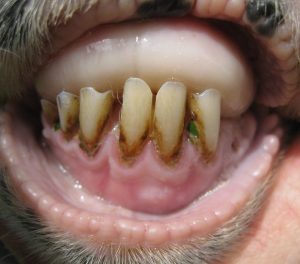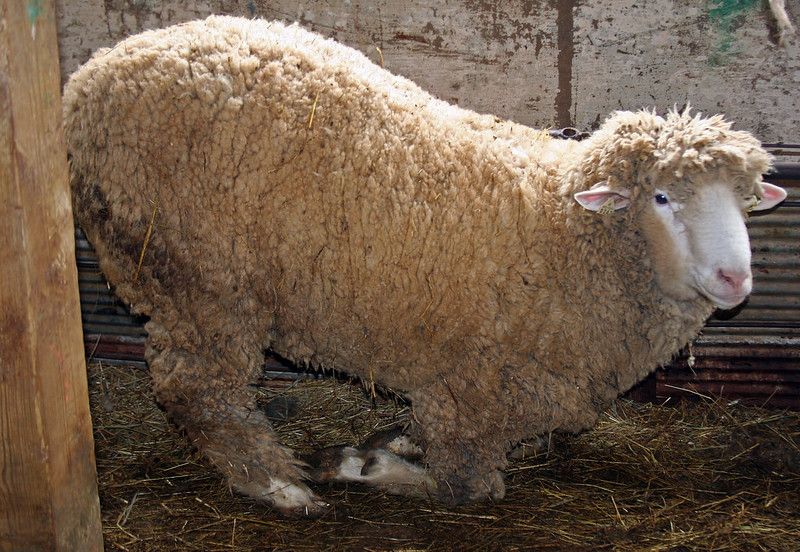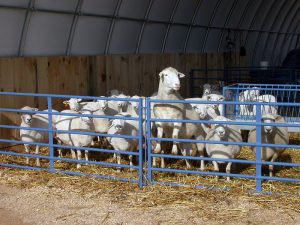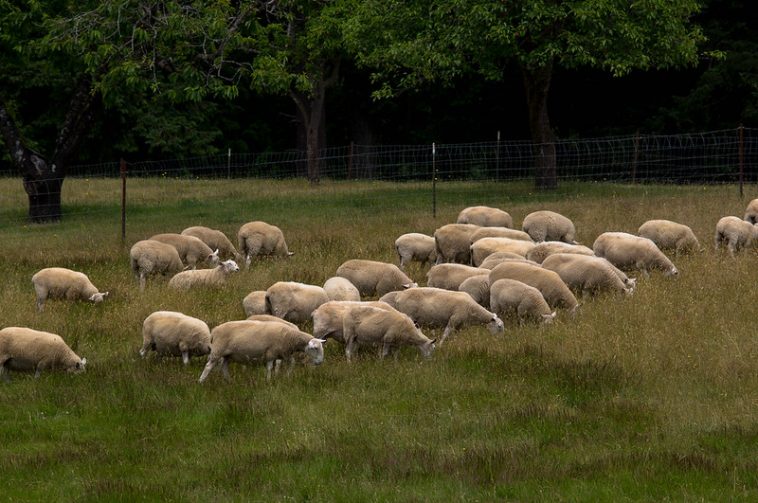Biosecurity means the management practices that are followed to prevent the introduction and spread of diseases. Healthy animals are the cornerstone of successful sheep farming. Biosecurity is important no matter what size flock or farm you have. It takes only one sheep to introduce a new disease and one farm to start a disease epidemic.
Acquisition of new animals
Purchasing new animals poses the single greatest risk to biosecurity on a sheep farm. While livestock may outwardly appear healthy, they could carry a wide variety of diseases. Whenever a new animal is introduced to the flock, there is a potential risk of that animal introducing a new disease.
It is important to note that sheep and goats share most of the same diseases. Sheep and goats also share some diseases with cattle.
Before adding new sheep to your farm, it is important to know the health status of the farm or flock(s) from which you are buying or receiving animals. Do not be afraid to ask questions about the farm’s health programme, and the disease status of the flock.
Only buy sheep from reputable breeders. Ideally, you should purchase sheep from closed or mostly closed flocks. A closed flock is a flock that has not introduced new animals for the past three or more years. It is best to buy sheep from as few sources as possible.
You should not purchase animals from flocks or farms in which you observe lameness, abscesses, sore mouth, ringworm, cloudy eyes, or other clinical signs of disease. While healthy-appearing animals may still be harbouring these diseases, many diseases can be avoided by thoroughly observing and inspecting the animals you purchase, and the farm from which they originate.
Inspect sheep for soundness
Mature ewes can be a good option when starting or expanding a flock, but you need to make sure they are healthy and sound. When purchasing mature ewes, be sure to palpate their udders to make sure they do not have any lumps, scar tissue, or hard spots, which could be indications of mastitis.

It is important to examine your sheep’s teeth to determine their age and soundness.
Examine their teeth to determine their age and soundness. As the sheep ages, the teeth will start to wear, spread, and eventually break off. Ewes with weak or almost no teeth only have few productive years left.
Palpate the testicles of rams. Do not purchase rams with reproductive abnormalities or structural defects. Make sure their mouths are sound, too.
Isolate new sheep
Newly purchased sheep should be isolated for at least two weeks, preferably thirty days, before allowing them to come into contact with other animals on your farm or being turned out to pasture. A period of isolation provides an opportunity to detect a disease problem before the rest of your sheep or premises are exposed.
Isolation/quarantine areas should not share the same space with the rest of the flock. A distance of at least thirty metres is recommended. The further the isolation pen from the rest of the flock, the better.
While in isolation, new animals should have their hooves trimmed and inspected for foot-rot and other hoof problems. It is not a bad idea to assume that all new animals were exposed to foot-rot. Foot-rot is usually introduced (via bacteria) to a farm through the introduction of infected animals.
To prevent the introduction of worms to your flock, it is important to deworm new animals.
Limit access to your farm and flock

Foot-rot is highly contagious.
Some diseases can be spread by contaminated footwear and vehicles. By limiting access to your farm and sheep, you can limit the risk of introducing and spreading diseases. When people are given access to your flock, they should not have been on another sheep farm for several days. They should be required to wear plastic boots or thoroughly disinfect their footwear before entering your sheep-raising areas. Make sure trucks and trailers are clean.
Maintain a closed flock
The best way to maintain a healthy flock is to maintain a closed flock. Once the genetics of the ewe flock has been established, replacement females should be selected from within the flock, and new acquisitions should be limited to rams.

A flock of sheep.
Good management
Dead carcasses, placenta, and foetal tissues should be removed immediately to prevent the introduction and/or spread of diseases. Composting is often the best way to dispose of reproductive wastes. Under no circumstances should carcasses and other waste products be left for dogs or wild animals to eat.
Every farmer should develop a written biosecurity plan and follow it to prevent the introduction of diseases and other problems.
Next month we shall look at waste management on sheep farms. We thank the ARC Institute for Agricultural Engineering in South Africa who made their manual on sheep production and facilities available to the readers of ProAgri.









